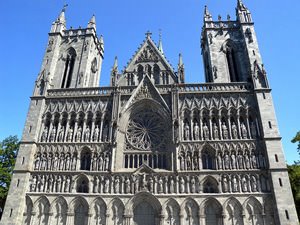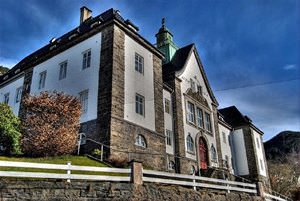
The official languages in Norway are Norwegian and Sami. Norway is part of the former Scandinavia, which is why the canons of the Old Norse language played a highly significant role in the formation of the linguistic direction of the local population. It should be noted also that the formation of the Danish and Swedish languages also occurred on the same basis of Old Norse language. This is why they are so similar to modern Norwegian. Many Norwegian dialects have even adopted various phrases and expressions from Danish and Swedish, safely introducing them into their language.
In Norway, the constitutional monarchy reigns. Power is inherited by the eldest son or daughter. The Head of the Country is the King or Queen. …
Read further
Despite the fact that the status of the official national language is Norwegian, there are in fact, two fundamentally different forms of the language used within the country. At the same time, both forms are almost evenly distributed among the speakers, and are used even at the official level when signing documents and publishing literature. Many experts have noted that the reason why there has been no contradiction for such a long time between the respective speakers of these two dialects of one language is because of its consolidation at the official level. Such aspect of Norwegian language, like Bokmål, began to develop actively during the middle Ages. It was used exclusively by the elite sections of society. The Nynorsk on the other hand, was created only recently, at the very beginning of the 19th century. It is now called “modern Norwegian” and is based on various dialects of the western part of Norway. Ivar Osen, a well-known linguist, carried out some great works in this linguistic direction.
In addition to the two main forms of Norwegian, many provinces employ other dialects and languages. Among the most popular dialects is riksmol and høgnorsk. Despite the fact that their bearers constitute a fairly large percentage of the local population, the authorities did not bestow the status of regional language on either of these two linguistic units. They are however still allowed to be used in official documents, in the media and literature. The Sami language, which has the status of a state language, is fundamentally different from Norwegian. It is based on the Finno-Ugric language group. To date, the natives of this dialect are more than 20,000 Norwegians, and this is despite the fact that the total population of the country is just over 4.5 million people. Copyright www.orangesmile.com
Norway’s economy depends on the world economic cycles, but in recent years it has maintained a remarkable stability. To date, this Scandinavian …
Read further
As for the religious landscape in the country, the dominant religion is Lutheranism. In Norway there is no distinction between the state and the church, but the Constitution of the country establishes the right to freedom of religion for every of her citizen. According to data for the past year, every 8 local residents out of 10 are regular parishioners of the Norwegian State Church. Despite the fact that the joint work of the State and the Church is supported in the Country, Norwegians do not like to practice their religion publicly. Mass religious holidays are not held on the territory of the country. Statistics show that less than 10% of the population goes to church and other religious activities more than once a month.
![Sandviken, Bergen Sandviken, Bergen]()
In addition to the followers of Luther’s evangelical teachings, representatives of other religious communities also live in Norway. They account for less than 6% of the total population. It should be noted that in Norway, various religious denominations exist in agreement with each other, such that there is no open hostility among one another. Nevertheless, the influence of the West is increasingly felt among young Norwegians. Many people no longer regard faith as a necessary aspect in the state system. At the moment, more than 6% of the local population does not profess any religion, and half of this number regards themselves as complete atheists. The largest public and religious movements that are not subject to the state Norwegian church are the Pentecostal movement, the Roman Catholic Church, Methodists and several other separate religious directions.
These spots really worth the attention of a real traveler-researcher.
…
Read further
It is worth noting that Christianity was introduced into the country around the beginning of the 11th century AD. The fact is that trade contacts were during this period established with various European countries that were believers of the Christian faith. A rather bigger role was played by the Vikings’ campaigns. The Anglo-Saxon Church was trying to conduct serious missionary work, while the ally countries of Germany and Denmark contributed to the fact that in all countries of Scandinavia, the worship of nature became the traditional religion. It is worth noting that these religious principles were once key to all Sami. To date, many schools have introduced a course of general education in religion.
 The official languages in Norway are Norwegian and Sami. Norway is part of the former Scandinavia, which is why the canons of the Old Norse language played a highly significant role in the formation of the linguistic direction of the local population. It should be noted also that the formation of the Danish and Swedish languages also occurred on the same basis of Old Norse language. This is why they are so similar to modern Norwegian. Many Norwegian dialects have even adopted various phrases and expressions from Danish and Swedish, safely introducing them into their language.
The official languages in Norway are Norwegian and Sami. Norway is part of the former Scandinavia, which is why the canons of the Old Norse language played a highly significant role in the formation of the linguistic direction of the local population. It should be noted also that the formation of the Danish and Swedish languages also occurred on the same basis of Old Norse language. This is why they are so similar to modern Norwegian. Many Norwegian dialects have even adopted various phrases and expressions from Danish and Swedish, safely introducing them into their language.
 In addition to the followers of Luther’s evangelical teachings, representatives of other religious communities also live in Norway. They account for less than 6% of the total population. It should be noted that in Norway, various religious denominations exist in agreement with each other, such that there is no open hostility among one another. Nevertheless, the influence of the West is increasingly felt among young Norwegians. Many people no longer regard faith as a necessary aspect in the state system. At the moment, more than 6% of the local population does not profess any religion, and half of this number regards themselves as complete atheists. The largest public and religious movements that are not subject to the state Norwegian church are the Pentecostal movement, the Roman Catholic Church, Methodists and several other separate religious directions.
In addition to the followers of Luther’s evangelical teachings, representatives of other religious communities also live in Norway. They account for less than 6% of the total population. It should be noted that in Norway, various religious denominations exist in agreement with each other, such that there is no open hostility among one another. Nevertheless, the influence of the West is increasingly felt among young Norwegians. Many people no longer regard faith as a necessary aspect in the state system. At the moment, more than 6% of the local population does not profess any religion, and half of this number regards themselves as complete atheists. The largest public and religious movements that are not subject to the state Norwegian church are the Pentecostal movement, the Roman Catholic Church, Methodists and several other separate religious directions.


